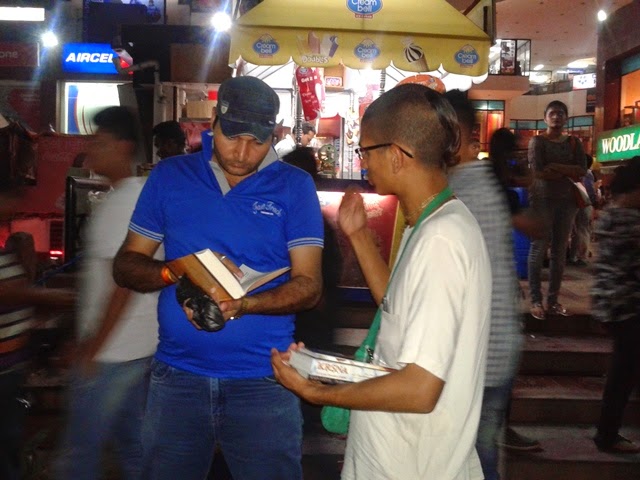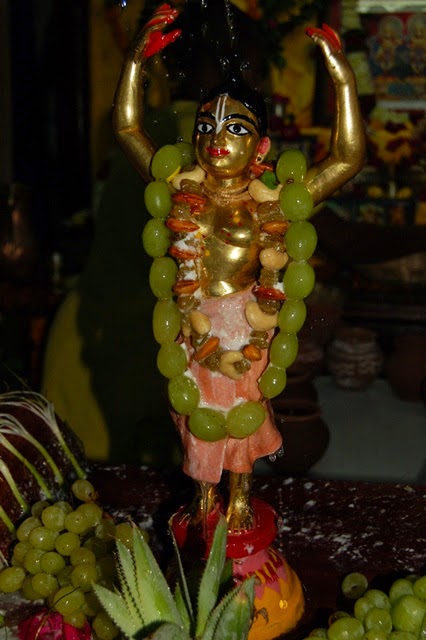Pusta Krsna: Is there a Vedic definition of science?
Prabhupada: Vijnana. Jnana-vijnana. [break] ...not this
science, experimental. That is not science. Vedic knowledge is science.
Pusta Krsna: So there is no experimental science in Vedic
culture.
Prabhupada: Experimental science is condemned. What you will
make, ex... You are imperfect. What is the value of your experiment? Therefore
it is rejected. Whatever you'll do, that is imperfect. First of all you become
perfect; then you make experiment. But you are... You remain imperfect, and you
making experiment. What is the value of it? [break] ...is no experimental
knowledge. All established truth. That is vijnana, or science.
Pusta Krsna: Established truth.
Prabhupada: Yes. The sun rises on the eastern side; that is
established truth. You cannot change it. And that is vijnana. Man dies. This is
established truth. You cannot make any change by
experimental knowledge. This
is vijnana. Nrpa nirnita: "It is already settled." In the Vedic
knowledge there is no such thing as laboratory or experiment, discovery,
nothing.
Pusta Krsna: People blindly would accept that cow dung was
purified without having to test it.
Prabhupada: Yes. But you make experiment; you will find it
all right. So we save time. [break] ...no experiment. [break] ...experiment has
become successful? Hm?
Pusta Krsna: Well, they've cured certain diseases by
experimentation.
Prabhupada: That is success? You stop disease. What is this,
"cure disease"? Malaria, if it is not here, it is somewhere there.
And if I am not suffering from malaria, I am suffering from syphilis. So what
is this cure, experiment? Disease must be there. So you stop it. Then it is
success.
Pusta Krsna: So it is not possible to stop disease.
Prabhupada: No. How it is possible?
Pusta Krsna: Is it worthwhile to try to prolong life?
Prabhupada: It is also condemned. Prolonged life... Suppose
you live hundred years and a tree lives five thousand years, ten thousand
years. Then what is the use of prolonging life, life like this? Is that very
good life?
Pusta Krsna: No.
Prabhupada: Standing in one place for ten thousand years?
Why should you prolong your life? For suffering? You are suffering, that is
your problem, so what is the use of prolonging your life? This is foolishness.
What do you gain by prolonging life if you are suffering? Stop suffering. That
is wanted. How you can stop suffering? With suffering, prolonging life, what is
the benefit?
Pusta Krsna: Just means more, longer suffering.
Prabhupada: Yes. And even if you prolong life, how long
you'll prolong? There are trees. They are thousand times prolonging than your
life. In... What is called? San Francisco, the Golden...
Pusta Krsna: Redwood trees.
Prabhupada: Redwood trees. One redwood, already seven
thousand years old, they told me. So what is the benefit, seven thousand years
standing in one place, very long? Hm? What is the benefit? You are trying to
prolong life. Very good idea. But what is the use of prolonging life while
suffering? One side, you are trying to prolong life; the other side, for acute
suffering, one is committing suicide. So why this contradictory proposal?
Harikesa: Well, only some people commit suicide. As far as
I'm concerned, I'm very happy. I have my car, my air conditioner...
Prabhupada: That means you are fool number one. That means
you are fool number one. As soon as you say, "I am happy," it is
immediately proved that you are a rascal, fool number one.
Pusta Krsna: But everyone is afraid of death. They don't
like the idea of dying. Put if off.
Prabhupada: Yes. So therefore, you cure that first of all;
then prolong life that there will be no death. Then you prolong life is... Make
some understand. Can go this side?
Harikesa: So it's not possible that anyone's happy? There is
no possibility of anyone being happy.
Prabhupada: No. One who thinks he is happy, he is number one
fool.
Pusta Krsna: Everyone is searching after material happiness.
Prabhupada: Yes. But there is no happiness.
[ Morning Walk -- October 20,
1975, Johannesburg]










































